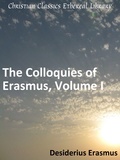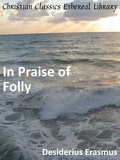Desiderius Erasmus
Humanist scholar
Biography
The Dutch humanist, Desiderius Erasmus, was born at Rotterdam, apparently on October 28, 1466, the illegitimate son of a physician's daughter by a man who afterwards turned monk. He was called Gerrit Gerritszoon (Dutch for Gerard Gerardson) but himself adopted the tautalogical double name by which he is known. He attended the school of the "Brothers of the Common Life" at Deventer. On his parents' death his guardians insisted on his entering a monastery and in the Augustinian college of Stein near Gouda he spent six years -- it was certainly this personal experience of the ways of the monks that made Erasmus their relentless enemy. At length the Bishop of Cambrai made him his private secretary. After taking priest's orders Erasmus went to Paris, where he studied at the Collège Montaigu. He resided in Paris until 1498, gaining a livelihood by teaching. Among his pupils was Lord Mountjoy, on whose invitation probably Erasmus made his first visit to England in 1498. He lived chiefly at Oxford, and through the influence of John Colet his contempt for the Schoolmen was intensified.
In 1500 he was again in France, and for the next six years lived chiefly at Paris. To this period belong his Adagiaand Enchiridion Militis Christiani. In 1506 he made a short visit to England, carried out a long-desired journey to Italy, and at Padua acted as tutor to Alexander, Archbishop of St. Andrews, natural son of James IV of Scotland. His visit closed with a short stay in Rome, whence he carried away a far more friendly impression than did Luther when he made his visit.
The accession of Henry VIII, and the invitation of Lord Mountjoy, induced Erasmus once more to make England his home. In his satire, Encomium Moriae (1509), we have him in his happiest vein, as the man of letters and the critic of kings and churchmen. Erasmus resided chiefly at Cambridge, where he acted as Margaret professor of Divinity and professor of Greek. After 1514 he lived alternatively in Basel and England, and from 1517 to 1521 at Louvain. In 1519 appeared the first edition of his Colloquia, usually regarded as his masterpiece. The audacity and incisiveness with which it handles the abuses of the Church prepared men's minds for the subsequent work of Martin Luther.
In 1516 was published his annotated New Testament, virtually the first Greek text, and in 1519 his edition on St. Jerome in nine folio volumes. In both of these works the aim of Erasmus was to introduce a more rational conception of Christian doctrine, and to emancipate men's minds from the frivolous and pedantic methods of the Scholastic theologians. But when the Lutheran revolution came he found himself in the most embarrassing position. Those of the old order fell upon him as the author of all the new troubles. The Lutherans assailed him for his cowardice and inconsistency in refusing to follow up his opinions to their legitimate conclusions. In 1521 he left Louvain, where the champions of the old faith had made his stay unendurable and with the exception of six years in Freiburg, he spent the rest of his life at Basel.
He edited a long succession of classical and patristic writers, and was engaged in continual controversies. The most important of these were with Ulrich von Hutten, Luther, and the Sorbonne, Hutten judged Erasmus harshly for not taking his place by the side of Luther; and with Luther himself Erasmus, after long hesitation, crossed swords in his De Libero Arbitrio (1523). Attacked by men like Hutten on the one side, he was as fiercely assailed on the other by the Sorbonne. By his Ciceroniansus he raised against himself new adversaries -- those humanists, namely, who set style above matter. Yet during his last years Erasmus enjoyed great fame and consideration. He died July 12, 1536.
Erasmus stands as the supreme type of cultivated common sense applied to human affairs. He rescued theology from the pedantries of the Schoolmen, exposed the abuses of the Church, and did more than any other single person to advance the Revival of Learning.



